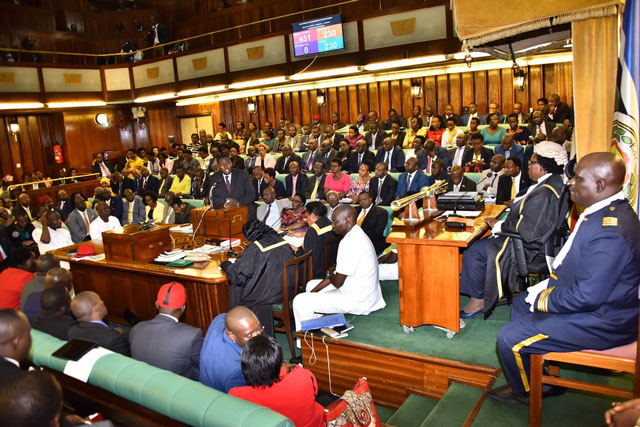
Eyes on Parliamentary Commission
Ugandan MPs are able to earn high pay and allowances because they decide how much they earn. Article 85 of the Constitution states that, “A Member of Parliament shall be paid such emoluments, such gratuity and pension, and shall be provided with such facilities, as may be determined by Parliament.”
According to the court ruling; that privilege remains but must be checked by the executive. Will the executive check parliament?
Currently, Under Article 85, parliament is a self-accounting body whose budget is charged directly on the Consolidated Fund. Under the Administration of Parliament Act, parliament has a Parliamentary Commission that determines the budget for parliament. The Parliamentary Commission is made up of the Speaker of Parliament, Leader of Government Business, the minister responsible for finance and three MPs elected by parliament, none of whom shall be a minister. The same body recommends to parliament the allowances payable and privileges available to MPs, the Speaker, and Deputy Speaker.
It is not clear how the Supreme Court ruling will affect the powers of the Parliamentary Commission. Will it not continue raising MPs allowances even as the salary remain untouched? The MPs have said before that the allowances they get are not a form of payment but are costs they incur at work. And that they have never raised their salaries and allowances because the Leader of Government Business (Prime minister), and Minister of Finance are involved in the decision and the President endorses it. Will the Supreme Court decision affect that argument?
The Anti-Corruption Coalition Uganda (ACCU) has consistently spoken strongly against MPs’ raising they pay. The ACCU argues that the public purse cannot sustain the high salaries and allowances. The ACCU has also proposed that salaries for MPs be determined by an independent Salaries and Remunerations Board.
But when asked whether Parliament would respect the Supreme Court decision and end raising their salaries and allowances, the ACCU Executive Director Cissy Kagaba was doubtful.
“They are greedy and self-centred,” she told The Monitor newspaper, “They would come up with other loopholes to justify their illegality.”
Teachers, police pay
Currently, a graduate level teacher of Science subjects earns Shs1.1m while one of Art subjects earns Shs790, 000 per month. A diploma level teacher on the other hand earns Shs700, 000 for teaching science subjects and Shs550, 000 for teaching Arts subjects.
A Probation Police Constable (PPC) takes home a monthly salary of Shs390, 000 and a Cadet Assistant Superintendent of Police (C/ASP) takes home Shs1.1 million.
Most of public servants earn in a year what Members of Parliament earn in a month.
****
 The Independent Uganda: You get the Truth we Pay the Price
The Independent Uganda: You get the Truth we Pay the Price




Hi independent.co.ug webmaster, You always provide valuable information.
Hello independent.co.ug webmaster, Keep sharing your knowledge!
Hi independent.co.ug owner, Thanks for the in-depth post!